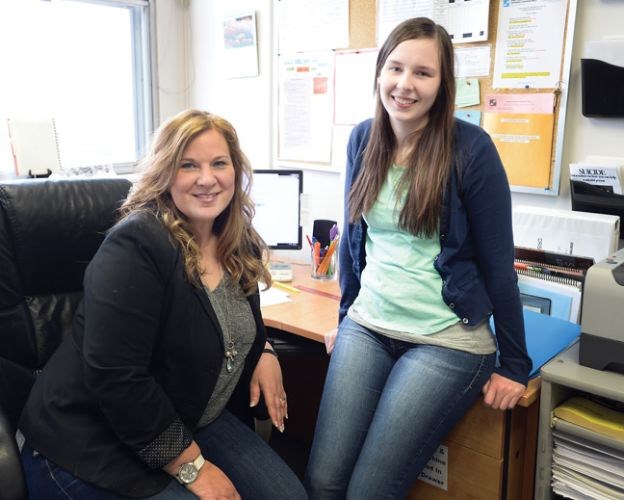For the staff and volunteers at the Crisis Centre for Northern B.C., it's OK to cry over spilled milk.
Those who man the phone lines are trained to look beyond what may not seem like a textbook definition of crisis and help callers identify what really prompted them to reach out for help.
"If a person calls and they're hysterical and upset about dropping a pizza on the floor the majority of people would look at that and go 'it's just a pizza, pick it up, get another one, etc., it's not that big of a deal,'" said Megan Usipuik, Crisis Centre program co-ordinator, using a scenario employed during volunteer training. "But to them, if you go into their history, or what led up to that point, that can be a huge deal to somebody who can't afford another pizza, who saved up all week for that pizza, who made a big celebration around this and then that happens. So really a crisis is different to every person."
It's this kind of welcoming ear and open mind that has fueled the Crisis Centre (officially the Crisis Prevention, Intervention and Information Centre for Northern B.C.) through its 45-year history, which they will celebrate during today's annual general meeting.
First incorporated in 1970 as the Prince George Crisis Intervention Society, the centre has grown from a grassroots operation on George Street that sheltered the homeless and answered calls to one that now covers the entire northern portion of the province from Quesnel.
From their office at the top floor of the Prince George Native Friendship Centre, volunteer and staff crisis line workers answer phone calls from various streams 24 hours per day, seven days per week.
There's a crisis line for anyone who needs a listening ear, a suicide-specific phone line and lines for mental health support and youth support.
There's also a youth online chat available between 4 p.m. and 10 p.m. everyday.
Suzanne LeBlanc is one of the centre's current 27 volunteers who has gone through the rigorous process (including 60 hours of classroom and practical training) required before being allowed to take calls. At a point in her life where she had more time to devote to giving back, LeBlanc said she was looking for something meaningful before coming on board in April.
"I think that we all have had those periods in our lives where being able to reach out and just talk to somebody who's listening would make a huge difference," LeBlanc said. "I can't think of anything more meaningful than being there for somebody who's got a crisis or is in need of just that ear to listen. It's been incredibly fulfilling - I think it's probably the most fulfilling volunteer work I've ever done."
Those who work for or donate their time to the Crisis Centre stress that they're not counselors, nor are they problem solvers. Rather, they provide short-term, confidential support for people in a time of distress and can offer information and referrals to resources if asked.
And unless it's a high-risk, emergency situation, crisis line workers aren't going to call the police or send for an ambulance for those calling the suicide line, either.
"We're there to listen to them and help them and safety plan with them and keep them safe," said Usipuik, adding that for some people in crisis, being at home where they're in control is better in an individual case as opposed to being restrained to a hospital.
It's an intense experience for executive director Sandra Boulianne, who, since first coming on board with the centre as programming co-ordinator 3 1/2 years ago, hasn't given up her no-longer-mandatory phone line shifts.
"And I love the intensity," said Boulianne. "It scared me at first, but I find it's really rewarding and it's something that I didn't want to let go of."
Having someone tell her that she saved their life is the most powerful thing Usipuik said she's ever heard - even if it's not strictly accurate.
"It was them - (the caller) saved their life. But it's very powerful to hear that," she said.


